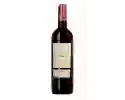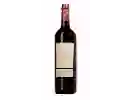
Château La TilleraieChâteau de Malbernat Pécharmant
This wine generally goes well with beef and game (deer, venison).
Wine flavors and olphactive analysis
Food and wine pairings with Château de Malbernat Pécharmant
Pairings that work perfectly with Château de Malbernat Pécharmant
Original food and wine pairings with Château de Malbernat Pécharmant
The Château de Malbernat Pécharmant of Château La Tilleraie matches generally quite well with dishes of beef or game (deer, venison) such as recipes of beef marengo "my mom" style or duck confit parmentier.
Details and technical informations about Château La Tilleraie's Château de Malbernat Pécharmant.
Discover the grape variety: Merlot
Merlot noir is a grape variety that originated in France (Bordeaux). It produces a variety of grape specially used for wine making. It is rare to find this grape to eat on our tables. This variety of grape is characterized by small to medium sized bunches, and medium sized grapes. Merlot noir can be found in many vineyards: South West, Languedoc & Roussillon, Cognac, Bordeaux, Loire Valley, Armagnac, Burgundy, Jura, Champagne, Rhone Valley, Beaujolais, Provence & Corsica, Savoie & Bugey.
Last vintages of this wine
The best vintages of Château de Malbernat Pécharmant from Château La Tilleraie are 2014, 2015, 2008
Informations about the Château La Tilleraie
The Château La Tilleraie is one of of the world's greatest estates. It offers 15 wines for sale in the of Pécharmant to come and discover on site or to buy online.
The wine region of Pécharmant
The wine region of Pécharmant is located in the region of Guyenne of South West of France. Wineries and vineyards like the Château de Tiregand or the Château Terre Vieille produce mainly wines red, white and sweet. The most planted grape varieties in the region of Pécharmant are Merlot, Cabernet-Sauvignon and Cabernet franc, they are then used in wines in blends or as a single variety. On the nose of Pécharmant often reveals types of flavors of non oak, plum or dark fruit and sometimes also flavors of black fruits, black cherries or cedar.
The wine region of South West
The South-West is a large territorial area of France, comprising the administrative regions of Aquitaine, Limousin and Midi-Pyrénées. However, as far as the French wine area is concerned, the South-West region is a little less clear-cut, as it excludes Bordeaux - a wine region so productive that it is de facto an area in its own right. The wines of the South West have a Long and eventful history. The local rivers play a key role, as they were the main trade routes to bring wines from traditional regions such as Cahors, Bergerac, Buzet and Gaillac to their markets.
The word of the wine: ODG
Organisation for the defence and management of wine, set up following the reform of the "syndicats de crus". The ODG is the collective organisation responsible for the defence and management of a product under an official sign of identification and quality and between wine appellations.














